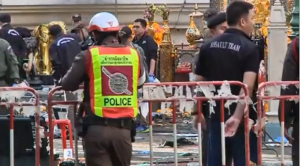
(Reuters) — Thai police began cleaning up the scene of Monday’s bombing and looking for clues at the shrine where more than 20 people died in an unprecedented attack in the Thai capital Bangkok.
A bomb planted at one of the Thai capital’s most renowned shrines on Monday killed 19, including three foreign tourists, and wounded scores in an attack the government called a bid to destroy the economy.
There was no immediate claim of responsibility for the blast at the Erawan shrine at a major city-centre intersection. Thai forces are fighting a low-level Muslim insurgency in the predominantly Buddhist country’s south, but those rebels have rarely launched attacks outside their heartland.
National police chief Somyot Poompanmuang told local media the explosion was caused by a pipe bomb placed inside the Erawan shrine.
A CNN report said that a Filipino and a Chinese were among those killed.
The blast happened around 19:00 local time near Erawan Shrine at Ratchaprasong intersection, a popular destination for domestic and foreign tourists. The injured, including Thais, Chinese and Filipinos, have been rushed to nearby hospitals, according to police.
“We rushed to the site immediately after we heard the explosion, and we saw a large number of injured people here,” said a rescue worker.
The explosive was planted by attackers with the aim of taking lives, Thai national police chief Somyot Pumpunmuang said. Police have confirmed the blast was caused by an improvised explosive device (IED) loaded with TNT. Two other bombs were defused by police.
The blast scattered debris all over the street, and the ensuing fire caused further explosions by igniting nearby motorcycles. Roads around the intersection have been closed while police and soldiers inspect the scene.
Officials from the Embassy of People’s Republic of China in Thailand rushed to the site of the blast and to hospitals to visit the injured.
According to the embassy, two Chinese nationals were killed and around 15 others injured, some seriously.
The number of Chinese casualties has yet to be finalized, the embassy said.
Volunteers are being organized to provide interpretation services at the hospitals.
Deputy Thai Premier Prawit Wongsuwan said the incident might scare foreign tourists away from Bangkok and adversely affect Thailand’s tourist industry and economy as a whole.
He declined to comment on whether the bombing might be politically motivated or relate to the separatist movement in the country’s southern region.
Thai Premier Prayut Chan-o-cha called an emergency meeting with high-level government officials and military officers in charge of national security.
Thailand’s National Council for Peace and Order (NCPO) has denied rumors that it had declared a state of emergency in Bangkok and ordered schools and businesses to remain closed on Tuesday.
The shrine, on a busy corner near top hotels, shopping centres, offices and a hospital, is a major attraction, especially for visitors from East Asia, including China. (with a report from China Central Television)







